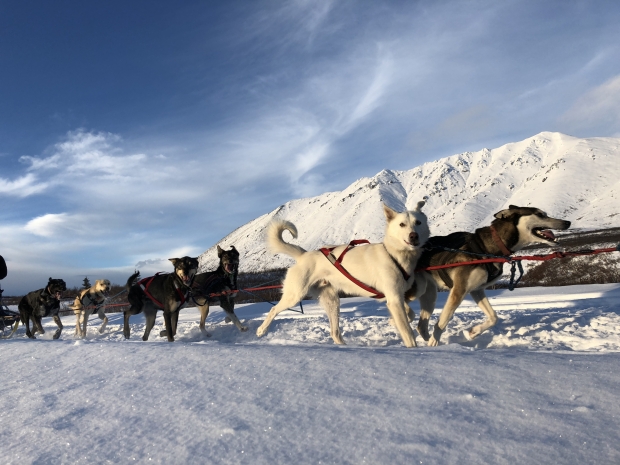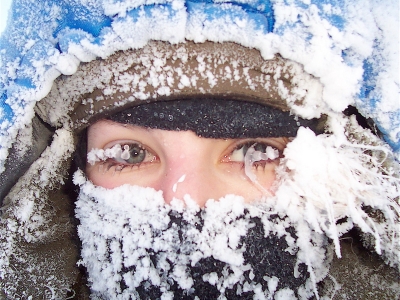Pandemic Lessons From Sled Dogs
Wisconsin musher Blair Braverman compares sled dog racing to combatting COVID-19.
The COVID-19 pandemic has pushed people into unknown territory. No one knows how long families and friends will have to stay apart or when the crisis will end. A Wisconsin musher says people living through the pandemic can learn from her time on the sled with her dogs.
Blair Braverman journeys hundreds of miles on a sled, and, while the dogs work hard, she said she’s harder on herself. But caring for her team has taught her to build rest into her routine, she said.
“You have to front load rest. You have to build in rest that the dogs don’t even want, because they are ready to keep going,” Braverman said. “Maybe you’re going to run 30 miles and you as the musher decide, ‘OK, we’re going to camp right here. There’s a nice river. There’s some water. I’m going to build a fire.’ The dogs think that is so boring, because they still have energy. They’re not tired yet! They want to keep going, and they don’t totally get a choice. That’s where I come in as a musher.”
Braverman said mushers cook the dogs’ meals, break out straw and blankets, take the dogs’ booties off and put on their coats so they can rest. Mushers meet the dogs’ needs. Braverman said it can be hard for humans to accept that food and rest are necessary. She said sometimes food and rest are all a person can handle, and that looks different for different people.
“If you’re really busy and exhausted, maybe that means you get a plate of frozen lasagna and you put that in the oven, and it’s still a warm meal,” Braverman said. “Maybe it means you love cooking and you’re going to make some elaborate thing from scratch.”
Braverman encourages people to do what they need to be OK in the moment, rather than pushing too hard for weeks or months. She said she’s quick to offer her dogs respite, and she’s trying to give herself grace when she gets sick or feels run down. The dogs also teach her about trust.
“They understand the weather differently than I do. They understand the texture of the snow. They hear things. Those are all instincts that I can’t even begin to imagine what that’s like, so I have to sort of let the dogs translate it for me,” Braverman said. “I’m paying attention to where they’re looking, where they’re smelling, their body language, their posture, the amount of energy that’s pouring out of them. And I trust them. I trust them to be honest in the sense that they’re telling me what they have. They’re giving me what they have, and I’m doing the same to them.”
Braverman and her husband, Quince Mountain, have a dog sled team called Braver Mountain Mushing in northern Wisconsin. Braverman ran the Iditarod in Alaska in 2019; her husband raced it in 2020. They also run hundreds of miles closer to home.
“For me, the trick has been to shift from the idea that I can plan for things, that that’s what will make me prepared, and instead try to think of it as, if I take care of myself, if I am prepared in sort of basic ways, then I don’t need to know what will happen because I trust my future self to be able to handle it when it comes,” Braverman said.
Braverman said she tries not to worry about the future, because worrying doesn’t change what happens. She encourages people not feel guilty for resting when they need to recharge, and she added that people still have the opportunity to care for themselves this far into the pandemic.
“I think it’s never too late right now, because we don’t know how long this will last. It comes back to that,” Braverman said. “But it’s never too late to take care of your basic needs. If you haven’t been resting a lot, you can start resting a little bit more. It doesn’t have to be all or nothing.”
Braverman said she finds peace when it feels like too much by spending time with her dogs as they run and play. She said she tries to find perspective by acknowledging that what matters is caring for her dogs. Even when the broader circumstances make it difficult, she said she can find happiness in one moment.
Listen to the WPR report here.
Wisconsin Musher Takes Lessons From Sled Dogs To Cope With Pandemic was originally published by Wisconsin Public Radio.
More about the Coronavirus Pandemic
- Governors Tony Evers, JB Pritzker, Tim Walz, and Gretchen Whitmer Issue a Joint Statement Concerning Reports that Donald Trump Gave Russian Dictator Putin American COVID-19 Supplies - Gov. Tony Evers - Oct 11th, 2024
- MHD Release: Milwaukee Health Department Launches COVID-19 Wastewater Testing Dashboard - City of Milwaukee Health Department - Jan 23rd, 2024
- Milwaukee County Announces New Policies Related to COVID-19 Pandemic - County Executive David Crowley - May 9th, 2023
- DHS Details End of Emergency COVID-19 Response - Wisconsin Department of Health Services - Apr 26th, 2023
- Milwaukee Health Department Announces Upcoming Changes to COVID-19 Services - City of Milwaukee Health Department - Mar 17th, 2023
- Fitzgerald Applauds Passage of COVID-19 Origin Act - U.S. Rep. Scott Fitzgerald - Mar 10th, 2023
- DHS Expands Free COVID-19 Testing Program - Wisconsin Department of Health Services - Feb 10th, 2023
- MKE County: COVID-19 Hospitalizations Rising - Graham Kilmer - Jan 16th, 2023
- Not Enough Getting Bivalent Booster Shots, State Health Officials Warn - Gaby Vinick - Dec 26th, 2022
- Nearly All Wisconsinites Age 6 Months and Older Now Eligible for Updated COVID-19 Vaccine - Wisconsin Department of Health Services - Dec 15th, 2022
Read more about Coronavirus Pandemic here























